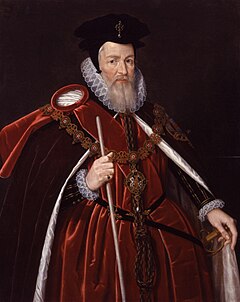Sir William Cecil
|
The Right Honourable The Lord Burghley KG PC |
|
|---|---|
 |
|
| Lord High Treasurer | |
|
In office July 1572 – 4 August 1598 |
|
| Monarch | Elizabeth I |
| Preceded by | The Marquess of Winchester |
| Succeeded by | The Earl of Dorset |
| Lord Privy Seal | |
|
In office 1590–1598 |
|
| Monarch | Elizabeth I |
| Preceded by | Sir Francis Walsingham |
| Succeeded by | Sir Robert Cecil |
|
In office 1571–1572 |
|
| Monarch | Elizabeth I |
| Preceded by | Sir Nicholas Bacon |
| Succeeded by | The Lord Howard of Effingham |
| Secretary of State | |
|
In office 22 November 1558 – 13 July 1572 |
|
| Monarch | Elizabeth I |
| Preceded by | John Boxall |
| Succeeded by | Thomas Smith |
|
In office 5 September 1550 – 19 July 1553 |
|
| Monarch |
Edward VI Jane |
| Preceded by | Nicholas Wotton |
| Succeeded by | John Cheke |
| Personal details | |
| Born |
William Cecil 13 September 1520 Bourne, Lincolnshire Kingdom of England |
| Died | 4 August 1598 (aged 77) Cecil House Westminster, London Kingdom of England |
| Resting place |
St. Martin's Church Stamford, Lincolnshire United Kingdom 52°38′56″N 0°28′39″W / 52.6490°N 0.4774°W |
| Spouse(s) | Mary Cheke (d. 1543) Mildred Cooke |
| Children |
Thomas Francisca Anne William (b-d.1559) William (b-d.1561) Robert Elizabeth |
| Parents |
Sir Richard Cecil Jane Heckington |
| Residence |
Burghley House Cecil House Theobalds House |
| Religion | Anglican |
William Cecil, 1st Baron Burghley KG PC (13 September 1520 – 4 August 1598) was an English statesman, the chief advisor of Queen Elizabeth I for most of her reign, twice Secretary of State (1550–53 and 1558–72) and Lord High Treasurer from 1572. Albert Pollard says, "From 1558 for forty years the biography of Cecil is almost indistinguishable from that of Elizabeth and from the history of England."
Burghley set as the main goal of English policy the creation of a united and Protestant British Isles. His methods were to complete the control of Ireland, and to forge an alliance with Scotland. Protection from invasion required a powerful Royal Navy. While he was not fully successful, his successors agreed with his goals. Derek Wilson (2013) says, "Few politicians were more subtle or unscrupulous than William Cecil." He was the founder of the Cecil dynasty which has produced many politicians including two Prime Ministers.
Cecil was born in Bourne, Lincolnshire, in 1520, the son of Sir Richard Cecil, owner of the Burghley estate (near Stamford, Lincolnshire), and his wife, Jane Heckington. Pedigrees, elaborated by Cecil himself with the help of William Camden the antiquary, associated him with the Welsh Cecils or Seisyllts of Allt-Yr-Ynys, Walterstone, on the border of Herefordshire and Monmouthshire, and traced his descent from an Owen of the time of Harold Godwinson and a Seisyllt of the reign of William Rufus. Seisyllt is the original Welsh spelling of the anglicised Cecil. There is now no doubt that the family was from the Welsh Marches and Lord Burghley himself acknowledged this in his family pedigree painted at Theobalds. The family had connections with Dore Abbey. However, the move to Stamford provides information concerning the Lord Treasurer's grandfather, David; he, according to Burghley's enemies, kept the best inn in Stamford. David somehow secured the favour of the first Tudor king, Henry VII, to whom he seems to have been Yeoman of the Guard. He was Sergeant-of-Arms to Henry VIII in 1526, Sheriff of Northamptonshire in 1532, and a Justice of the Peace for Rutland. His eldest son, Richard, Yeoman of the Wardrobe (died 1554), married Jane, daughter of William Heckington of Bourne, and was father of three daughters and the future Lord Burghley.
...
Wikipedia
